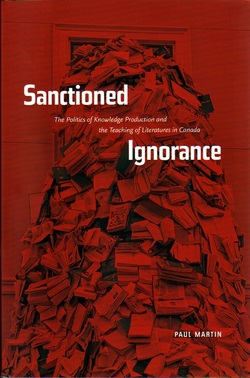
“Sanctioned Ignorance” is an aggressive title, taken from Gayatri Spivak’s A Critique of Postcolonial Reason. However, the ignorance referred to is not necessarily a deliberate one, although I suppose often consciously – and conveniently – acquiesced to. It’s an institutionally encouraged ignorance, here in Paul Martin’s view encouraged by the institution of anglophone-Canadian literature studies – a conveniently sanctioned ignorance of, among other things, the early history of Canadian Literature studies, of the 25% of Canadian literature produced by francophone Canadians, and of the tokenism of the representation of anglophone-Canadian literature in Canadian English department curricula – usually less than 10% of the total course offerings. Overall this ignorance is a comfortable habitus: Martin draws substantially here on the work of Pierre Bourdieu to theorize and describe its effects on teaching, research, and conceptions of canonicity.
Martin is a former director of the Canadian Studies Program at the University of Vermont and currently Faculty Development Coordinator at MacEwan University in Edmonton. His book is the culmination of a 20-year research project that began -- in my 1993 graduate course at Western Ontario -- with an investigation of the CanLit course descriptions of most anglophone-Canadian universities, resumed in 1997-98 with a more thorough collection course descriptions and a 6-week interview tour of anglophone and francophone professors in the field, and continued with an online investigation of relevant course descriptions for 2007-08. From this data he has created ranked lists of the 400 or so Canadian books that appear on CanLit course descriptions and made charts that show the percentages of Canadian Literature courses at 22 anglophone universities, percentages which in 2007 ranged from highs of more than 15% of the English department courses offered at the University of Victoria, Carleton, and Concordia to lows close to 5% at Simon Fraser, Calgary and Acadia. Evidently the presence of highly productive Canadianists at Simon Fraser or high-profile writers at Calgary has not readily translated into rich undergraduate CanLit offerings. Calgary ranks similarly in Martin’s 1997-98 findings.
Martin argues that the ways in which the various Canadian literatures have been configured in anglophone Canada reflect the kinds of Canada that the country’s anglophone elites have desired. In the 19th century the desire was for a British Canada in the which Canadian writers strove for but deferred to the greater “quality” of the British classics. In the late 20th century it was for an up-to-date Canada in which contemporary Canadian authors such as Davies, Atwood, Shields and Ondaatje competed successfully with American and British writers for international awards. This
 RSS Feed
RSS Feed